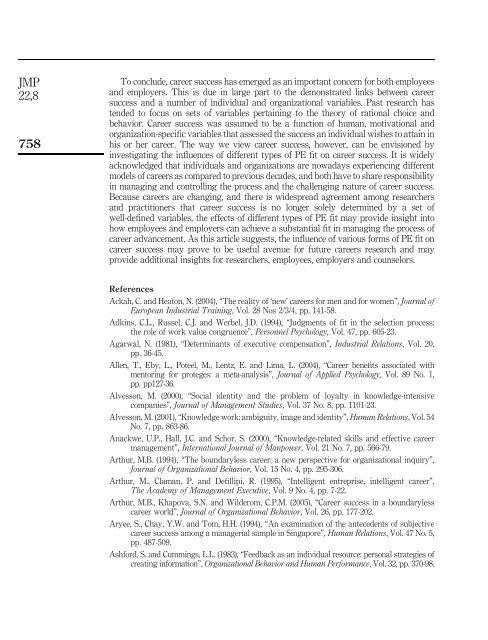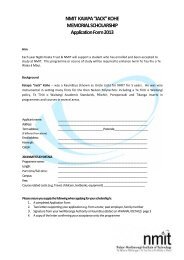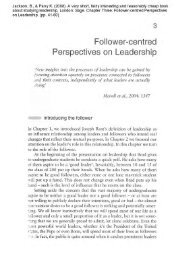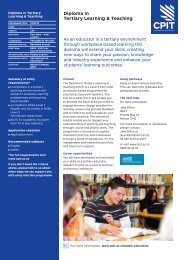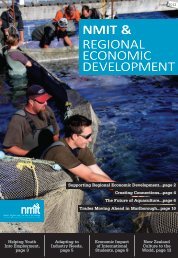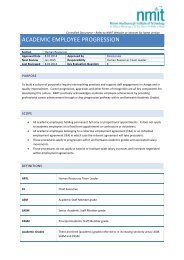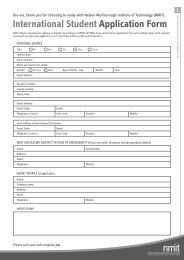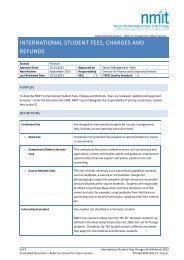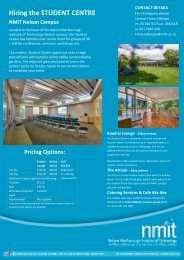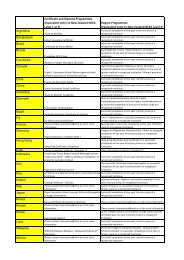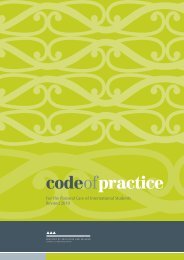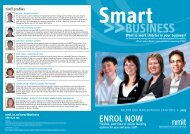Career success - 2007.pdf
Career success - 2007.pdf
Career success - 2007.pdf
You also want an ePaper? Increase the reach of your titles
YUMPU automatically turns print PDFs into web optimized ePapers that Google loves.
JMP22,8758To conclude, career <strong>success</strong> has emerged as an important concern for both employeesand employers. This is due in large part to the demonstrated links between career<strong>success</strong> and a number of individual and organizational variables. Past research hastended to focus on sets of variables pertaining to the theory of rational choice andbehavior. <strong>Career</strong> <strong>success</strong> was assumed to be a function of human, motivational andorganization-specific variables that assessed the <strong>success</strong> an individual wishes to attain inhis or her career. The way we view career <strong>success</strong>, however, can be envisioned byinvestigating the influences of different types of PE fit on career <strong>success</strong>. It is widelyacknowledged that individuals and organizations are nowadays experiencing differentmodels of careers as compared to previous decades, and both have to share responsibilityin managing and controlling the process and the challenging nature of career <strong>success</strong>.Because careers are changing, and there is widespread agreement among researchersand practitioners that career <strong>success</strong> is no longer solely determined by a set ofwell-defined variables, the effects of different types of PE fit may provide insight intohow employees and employers can achieve a substantial fit in managing the process ofcareer advancement. As this article suggests, the influence of various forms of PE fit oncareer <strong>success</strong> may prove to be useful avenue for future careers research and mayprovide additional insights for researchers, employees, employers and counselors.ReferencesAckah, C. and Heaton, N. (2004), “The reality of ‘new’ careers for men and for women”, Journal ofEuropean Industrial Training, Vol. 28 Nos 2/3/4, pp. 141-58.Adkins, C.L., Russel, C.J. and Werbel, J.D. (1994), “Judgments of fit in the selection process:the role of work value congruence”, Personnel Psychology, Vol. 47, pp. 605-23.Agarwal, N. (1981), “Determinants of executive compensation”, Industrial Relations, Vol. 20,pp. 36-45.Allen, T., Eby, L., Poteel, M., Lentz, E. and Lima, L. (2004), “<strong>Career</strong> benefits associated withmentoring for proteges: a meta-analysis”, Journal of Applied Psychology, Vol.89No.1,pp. pp127-36.Alvesson, M. (2000), “Social identity and the problem of loyalty in knowledge-intensivecompanies”, Journal of Management Studies, Vol. 37 No. 8, pp. 1101-23.Alvesson, M. (2001), “Knowledge work: ambiguity, image and identity”, Human Relations, Vol. 54No. 7, pp. 863-86.Anackwe, U.P., Hall, J.C. and Schor, S. (2000), “Knowledge-related skills and effective careermanagement”, International Journal of Manpower, Vol. 21 No. 7, pp. 566-79.Arthur, M.B. (1994), “The boundaryless career: a new perspective for organizational inquiry”,Journal of Organizational Behavior, Vol. 15 No. 4, pp. 295-306.Arthur, M., Claman, P. and Defillipi, R. (1995), “Intelligent entreprise, intelligent career”,The Academy of Management Executive, Vol. 9 No. 4, pp. 7-22.Arthur, M.B., Khapova, S.N. and Wilderom, C.P.M. (2005), “<strong>Career</strong> <strong>success</strong> in a boundarylesscareer world”, Journal of Organizational Behavior, Vol. 26, pp. 177-202.Aryee, S., Chay, Y.W. and Tom, H.H. (1994), “An examination of the antecedents of subjectivecareer <strong>success</strong> among a managerial sample in Singapore”, Human Relations, Vol. 47 No. 5,pp. 487-509.Ashford, S. and Cummings, L.L. (1983), “Feedback as an individual resource: personal strategies ofcreating information”, Organizational Behavior and Human Performance, Vol. 32, pp. 370-98.


